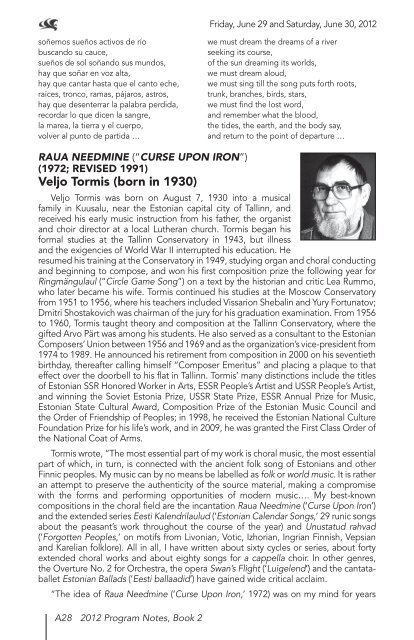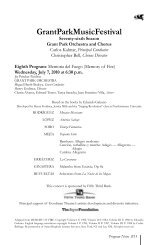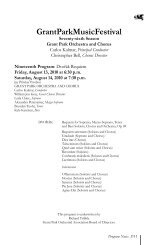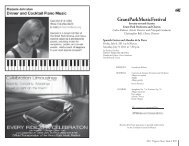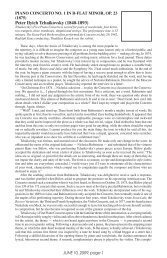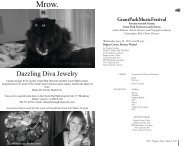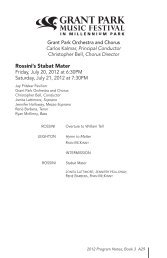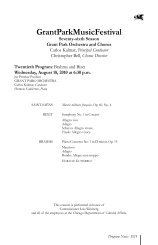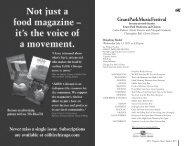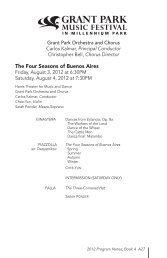Golden Anniversary Choral Spectacular - The Grant Park Music ...
Golden Anniversary Choral Spectacular - The Grant Park Music ...
Golden Anniversary Choral Spectacular - The Grant Park Music ...
You also want an ePaper? Increase the reach of your titles
YUMPU automatically turns print PDFs into web optimized ePapers that Google loves.
soñemos sueños activos de río we must dream the dreams of a river<br />
buscando su cauce, seeking its course,<br />
sueños de sol soñando sus mundos, of the sun dreaming its worlds,<br />
hay que soñar en voz alta, we must dream aloud,<br />
hay que cantar hasta que el canto eche, we must sing till the song puts forth roots,<br />
raíces, tronco, ramas, pájaros, astros, trunk, branches, birds, stars,<br />
hay que desenterrar la palabra perdida, we must find the lost word,<br />
recordar lo que dicen la sangre, and remember what the blood,<br />
la marea, la tierra y el cuerpo, the tides, the earth, and the body say,<br />
volver al punto de partida … and return to the point of departure …<br />
raua NEEdMINE (“curSE upoN IroN”)<br />
(1972; rEViSED 1991)<br />
Veljo Tormis (born in 1930)<br />
Veljo Tormis was born on August 7, 1930 into a musical<br />
family in Kuusalu, near the Estonian capital city of Tallinn, and<br />
received his early music instruction from his father, the organist<br />
and choir director at a local Lutheran church. Tormis began his<br />
formal studies at the Tallinn Conservatory in 1943, but illness<br />
and the exigencies of World War II interrupted his education. He<br />
resumed his training at the Conservatory in 1949, studying organ and choral conducting<br />
and beginning to compose, and won his first composition prize the following year for<br />
Ringmängulaul (“Circle Game Song”) on a text by the historian and critic Lea Rummo,<br />
who later became his wife. Tormis continued his studies at the Moscow Conservatory<br />
from 1951 to 1956, where his teachers included Vissarion Shebalin and Yury Fortunatov;<br />
Dmitri Shostakovich was chairman of the jury for his graduation examination. From 1956<br />
to 1960, Tormis taught theory and composition at the Tallinn Conservatory, where the<br />
gifted Arvo Pärt was among his students. He also served as a consultant to the Estonian<br />
Composers’ Union between 1956 and 1969 and as the organization’s vice-president from<br />
1974 to 1989. He announced his retirement from composition in 2000 on his seventieth<br />
birthday, thereafter calling himself “Composer Emeritus” and placing a plaque to that<br />
effect over the doorbell to his flat in Tallinn. Tormis’ many distinctions include the titles<br />
of Estonian SSR Honored Worker in Arts, ESSR People’s Artist and USSR People’s Artist,<br />
and winning the Soviet Estonia Prize, USSR State Prize, ESSR Annual Prize for <strong>Music</strong>,<br />
Estonian State Cultural Award, Composition Prize of the Estonian <strong>Music</strong> Council and<br />
the order of Friendship of Peoples; in 1998, he received the Estonian National Culture<br />
Foundation Prize for his life’s work, and in 2009, he was granted the First Class order of<br />
the National Coat of Arms.<br />
Tormis wrote, “<strong>The</strong> most essential part of my work is choral music, the most essential<br />
part of which, in turn, is connected with the ancient folk song of Estonians and other<br />
Finnic peoples. My music can by no means be labelled as folk or world music. It is rather<br />
an attempt to preserve the authenticity of the source material, making a compromise<br />
with the forms and performing opportunities of modern music…. My best-known<br />
compositions in the choral field are the incantation Raua Needmine (‘Curse Upon Iron’)<br />
and the extended series Eesti Kalendrilaulud (‘Estonian Calendar Songs,’ 29 runic songs<br />
about the peasant’s work throughout the course of the year) and Unustatud rahvad<br />
(‘Forgotten Peoples,’ on motifs from Livonian, Votic, Izhorian, Ingrian Finnish, Vepsian<br />
and Karelian folklore). All in all, I have written about sixty cycles or series, about forty<br />
extended choral works and about eighty songs for a cappella choir. In other genres,<br />
the overture No. 2 for orchestra, the opera Swan’s Flight (‘Luigelend’) and the cantataballet<br />
Estonian Ballads (‘Eesti ballaadid’) have gained wide critical acclaim.<br />
“<strong>The</strong> idea of Raua Needmine (‘Curse Upon Iron,’ 1972) was on my mind for years<br />
A28 2012 Program Notes, Book 2<br />
Friday, June 29 and Saturday, June 30, 2012


